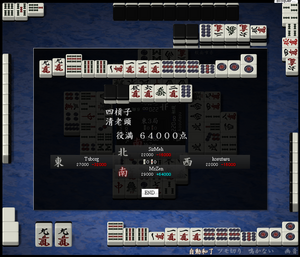Multiple yakuman: Difference between revisions
| Line 11: | Line 11: | ||
===Single yakuman cap=== | ===Single yakuman cap=== | ||
Many professional organizations in Japan limit all payouts to a single yakuman, being 32,000 | Many professional organizations in Japan limit all payouts to a single yakuman, being 32,000 points for nondealer and 48,000 points for the [[oya|dealer]]. This means that there are no double yakuman, and yakuman are not cumulative. | ||
===Cumulative single yakuman=== | ===Cumulative single yakuman=== | ||
Revision as of 07:57, 10 September 2022

Multiple yakuman involve hands with more than one yakuman, as the name implies. While regular yaku may be stacked in one hand to raise value, the same can be done with different yakuman, where applicable.
In terms of scoring, the number of yakuman in the hand serves as a multiplier to the base yakuman point value. As a result, extremely high scoring hands are made possible.
If, in addition to one or more regular yakuman, the hand would also be a kazoe yakuman, no extra yakuman is added for this. For regular yakuman, han from normal yaku and dora are not counted.
Scoring
Application of the multiple yakuman may vary, as some rules do not allow multiple yakuman in terms of scoring. This is largely due to the extremely high value applied by multiple yakuman. In this case, even if the hand is composed of multiple yakuman, the score payout may be capped.
Single yakuman cap
Many professional organizations in Japan limit all payouts to a single yakuman, being 32,000 points for nondealer and 48,000 points for the dealer. This means that there are no double yakuman, and yakuman are not cumulative.
Cumulative single yakuman
Some groups, most notably Tenhou.net, do not award double yakuman for any specific hand. However, multiple yakuman are still possible, if two (or more) different yakuman are completed in the same hand. Most commonly, this involves tsuuiisou alongside either shousuushii or daisangen. Other combinations are possible, but they are very rare.
Full scoring
Under full scoring rules, four yakuman patterns may produce specific instances, that are worth double yakuman. Under this ruleset, the combination of yakuman are applied. In addition, particularly rare and difficult hands are worth double the score value of a normal yakuman by themselves.
- Daisuushii is more difficult to complete than the lesser hand shousuushii. Accordingly, daisuushii is worth double.
- Kokushi musou is double yakuman when completed on a 13-sided wait.
- Chuuren poutou is double yakuman when completed on a 9-sided wait.
- Suuankou is double yakuman when completed on a tanki wait. This is also the only way that the hand can win by ron.
- Tsuuiisou can be double with the optional pattern of daichisei.
Point values
Yakuman point values are transferred as follows:
| Dealer ron | Dealer tsumo | Non-dealer ron | Non-dealer tsumo |
|---|---|---|---|
| 48,000 from the discarder | 16,000 from all players | 32,000 from the discarder | 16,000 from the dealer; 8,000 from the non-dealers |
With multiple yakuman, point values are based on the yakuman point values and multiplied by the applied number of yakuman in the hand. With the single yakuman cap, this multiplier is irrelevant.
Example value differences based on applied rules
* Single yakuman cap: 1 yakuman. * Cumulative single yakuman: 1 yakuman. * Full scoring: 2 yakuman.
* Single yakuman cap: 1 yakuman. * Cumulative single yakuman: 2 yakuman. * Full scoring: 2 yakuman.
* Single yakuman cap: 1 yakuman. * Cumulative single yakuman: 2 yakuman. * Full scoring: 2 yakuman.
* Single yakuman cap: 1 yakuman. * Cumulative single yakuman: 3 yakuman. * Full scoring: 4 yakuman.
Game examples
| |||||||||||||||||||||||||||||||
